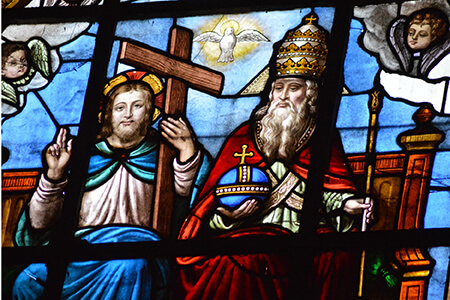 EX 34:4B-6, 8-9
EX 34:4B-6, 8-9
 2 Corinthians 13:11-13
2 Corinthians 13:11-13
 John 3:16-18
John 3:16-18
While the celebration of Pentecost signifies the birth of the Church, the celebration of the Holy Trinity that follows reveals the fundamental belief of the Church – the doctrine of the Holy Trinity. Inasmuch as it is fundamental, it is the most difficult to comprehend. It is hard to comprehend because it is so different and novel from the beliefs of other monotheistic religions. The Christian God is one in three persons; not three gods but one God in the divine persons of the Father, the Son and the Holy Spirit. Since many attempts have been made to address this “mystery”, I would like then, to try to reflect, based on this Sunday's readings, how this Trinitarian God relates to us.
First Reading reveals this triune God is a god who is “merciful and gracious, slow to anger, and abounding in steadfast love and faithfulness” (Ex 34:6). A god who saved the Israelites from the Egyptians, who helped them to cross the Red Sea, who accompanied them in the wilderness, who worked wonders and led them into the Promised Land. This is the God who goes with humanity. He is not a god who just looks from his lofty dwelling but one who journeys with us. We, too, are like the Israelites. We face obstacles, we sin, we struggle and we fall; but God is always with us. He walks beside us, sustains us, protects us and cares for us as a father for his children. He is a father who is compassionate and hears his children's cries (rf Ex 3:7-10). No wonder Moses prays, “let the Lord go with us . . . pardon our iniquity and our sin, and take us for your inheritance” (Ex 34:9).
The Gospel Reading reveals this God is a god who “so loved the world” that He concretely comes down to us (Jn 3:16). This time, not only with His presence but truly becomes one of us in flesh and blood (rf Jn 1:14). And this God of love manifests His love for all of us by giving His only begotten Son who is with the Father from the very beginning (rf Jn 3:16, 1:2). The Son was sent from the Father's bosom to save the world and He was the revelation of the Father, “. . . he who sees me sees also the Father” (rf Jn 1:18, 14:9). This Son, being God Himself, is willing to experience what we experience, including sufferings and death. When we are in doubt of God's love, look at the cross, the pinnacle of His love for us, and meditate its “breadth and length and height and depth”, so that we may “know the love of Christ that surpasses knowledge” (Eph 3:18-19). And by believing in Him, we “may not perish, but may have life everlasting” (Jn 3:16).
Second Reading reveals this God is a god of peace. This is not the kind of peace without conflicts but peace that is within the Trinity; the peace that Jesus gave to His disciples before He departed from the world. “Peace I leave with you; my peace I give you. I do not give to you as the world gives” (Jn 14:27). It is “the peace of God, which transcends all understanding, [which] will guard your hearts and your minds in Christ Jesus” (Phil 4:7). It is the kind of peace that “even though [we] walk through the valley of the shadow of death, [we] will fear no evil” (Ps 23:4). It is a tranquil state of appreciation and faith. This peace is given through the Holy Spirit to those who agree and live in peace with each other (rf 2 Cor 13:11).
Perhaps the final verse in the Second Letter to the Corinthians – “The grace of the Lord Jesus Christ, the love of God and the communion of the Holy Spirit” – sums up the doctrine of the Holy Trinity's ecclesial unity in its clearest way. Yes, we may not be able to fully understand the “mystery,” but our Triune God manifests Himself continuously throughout our human history. Whenever we forgive, love and unify, He comes and dwells in us; and the love, peace and joy of the Trinity will be reflected in us.
